
Duncan Wood: The maestro
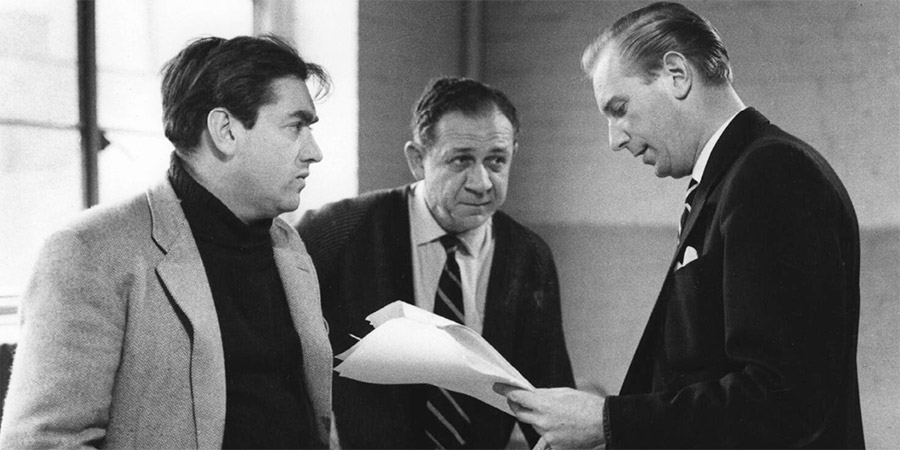
If one man can be regarded as the founding father of the British TV sitcom, as far as creating the template for its craft and care is concerned, then it is surely Duncan Wood. It is him, more than anyone else, we have to thank for making the medium meet this need.
A tall, broad and big-shouldered man, whom Spike Milligan once said was the only boss he accepted being bossed-about by, he strode ahead and took control of how television comedy, in its early days, was constructed for public consumption. From Hancock's Half Hour to Rising Damp, few British situation-comedies failed to be influenced, either directly or indirectly, by his insight and invention.
He did not merely plant the seed. He also clarified the nature of its cultivation.
His professional career often mirrored that of his similarly eminent contemporary, Dennis Main Wilson: roots in radio, a rapid rise in television, a close connection with Tony Hancock and Galton and Simpson, and a string of successful sitcoms that helped set and then extend the highest standards of that genre.
They had very different personalities. Whereas Main Wilson was quite an outgoing, intense and garrulous sort of character, Wood, though a very genial companion, tended to be relatively quiet and more reserved; Main Wilson's route to seeing his projects reach the screen often involved instinctive gambles, unorthodox spy-like intrigues and explosive arguments, Wood relied more on methodical preparation and firm but fair-minded discussions; and while Main Wilson never really felt (nor wanted to feel) entirely at home within any corporate structure, Wood always appeared quite comfortable and content.
As producers, however, the two men (who seemed more than capable of sustaining themselves on a diet of cigarettes and Scotch) had more in common. Wood was the more patient of the pair, and more likely to keep his concentration, energy and enthusiasm throughout the lifespan of a long-running show, and technically he was rather more disciplined and deliberate. Both men, nonetheless, were exceptionally passionate about producing programmes that pleased the public, exhibited a real and strong affinity for the art, craft and anxieties of their actors, and, even more so, an unshakeable respect for their writers.
Main Wilson always said, 'In my shows, the script is always the star'. Wood felt, in this sense, exactly the same.
Wood came to the BBC from Bristol, where he was born in 1925. Trained as an outside broadcast engineer, his progress was interrupted by the war (during which he served in South East Asia with the Royal Signals), but he returned to the Corporation in 1948 (his first new assignment being at Wembley for the Olympic Games). His affinity for shows featuring music as well as comedy (his mother was a professional musician) was spotted at the start of the 1950s by Frank Gillard, the then-Head of the BBC's Western Region, who appointed him a producer of radio variety programmes.
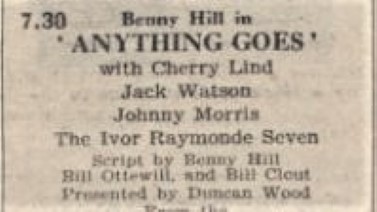
After impressing with the calm, confident and crisis-free way that he oversaw such popular series as Workers' Playtime, Variety Ahoy!, Everybody Swing and Anything Goes (dealing, in the process, with such up-and-coming comics as Dick Emery, Jon Pertwee, Tony Hancock, Beryl Reid, Alfred Marks and, in his first show of his own, Benny Hill), he was encouraged to make the transition to television in 1953.
As was usual in those days for producers who were new to the medium, he was tried and tested on a wide range of projects, ranging from the self-explanatory Country Dancing and Time For Dancing (both 1954) to the Kenneth Horne panel show Find The Link (1955), but it was with comedy shows that he quickly made his mark. Starting in 1955 with Great Scott - It's Maynard! - a sketch show featuring Terry Scott and Bill Maynard, and written by Lew Schwarz, Eric Merriman, Dave Freeman and Johnny Speight - he established himself rapidly as one of BBC TV's first, and most reliable, specialists in this area of show business.
Over the next decade or so he presided over such major successes as Terry-Thomas's Strictly T-T (1956), The Benny Hill Show (1957 and 1962-3), Sid Caesar Invites You (1958), Peter Sellers's The April 8th Show (Seven Days Early) (1958), a special recording of Beyond The Fringe (1964), Frankie Howerd (1964-66), The Ken Dodd Show (1966) and The Frost Report (1966). It was with sitcoms, however, that he really stamped his signature, playing a crucial role in creating and advancing what would become one of the BBC's proudest and most popular traditions.
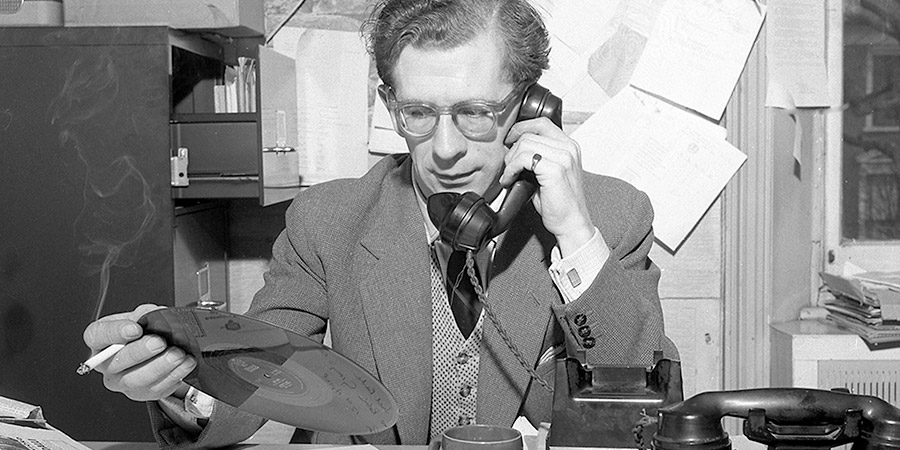
It began in 1956 with what now seems like the symbolic handing-over of Hancock's Half Hour by Dennis Main Wilson in radio to Duncan Wood in television. Main Wilson had started the sitcom two years earlier and triumphed with it on the wireless, and now Wood took up the baton and triumphed with it on the screen.
Over the course of the next five years, the Hancock shows turned the genre of the sitcom into one of the most integral elements of British television. Captivating the public and critics alike, it showed that comedy, just as much as drama, could deliver something that really resonated with the viewing nation.
How did Duncan Wood help the show to achieve such an impact? There were a number of factors.
The first was his quite deliberate assumption of complete control over the whole programme-making process, which, as a result, fully professionalised the then-still inchoate role of the 'producer/director'. Several other figures, in those days, often served formally as both producer and director of their television programmes, but while some struggled to cope with the multiple chores and challenges associated with both roles, and others settled for discreetly delegating a few of the actual duties, Duncan Wood fused the twin titles with rare confidence and commitment.
'The role of the producer,' he would say, 'is to accept responsibility for the show and its background organisation, for the handling of money, for casting. The role of a director is to get the performances out of the artists and the script and to transfer those performances to the screen. I've always believed in the handmade product, so I like doing both. I find it very difficult to divide it down the middle.'
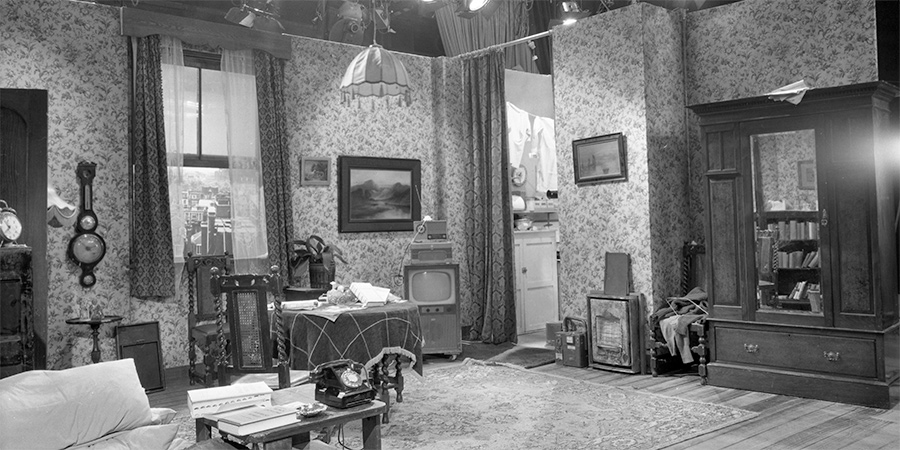
No one appreciated the big picture, as well as the fine details, better than Wood did, and now, as producer/director, he was able to attend to them both. As he later explained to the writer David Nathan:
A [producer/director] has to be something of an architect so that you can tell your designer the kind of room you want because you are already in your mind visualising how the actors are going to work in that room, where they're going to move and what they're going to do. He has to be a bit of a musician because he has to explain to the musical director before rehearsal what he is going to get out of a scene so that the music can be written. All this means that he is committing himself to a certain mood before he's even spoken to the actors. He has to know something about writing. Cutting a script is a very difficult thing and it's no use working on the principle of leaving out the bits that aren't funny, because you end up with a script full of gags and no situation. It often pays to cut, with a bleeding heart, very funny things and keep to other things which maintain the story-line. He need not act, but he has to have a feel for acting so that if an actor tells him he cannot say a line, the [producer/director] has to be able to say it himself, suggest another way of doing it or agree. [The producer/director] not only has to have a technical ability with the cameras, the tools of the trade, but sooner or later must [also] ask his performers to accept some of the technicalese because without basic knowledge of how the camera works they will never do the [producer/director] or themselves justice.
Wood, embracing the responsibility as well as the power that came with this multi-faceted role, did all of this and more. He worked patiently and precisely with the writers Galton and Simpson, for example, ensuring that each script had the right balance between logic, pace, character and comedy. 'He was always so thorough and thoughtful,' Alan Simpson would tell me. 'It was hugely reassuring to know that Duncan was going to go through each script, because you just knew that, if we'd missed a problem, he'd certainly spot it and he'd help us solve it. He knew exactly what he was doing.'
Another aspect that Wood greatly improved, once the script was properly polished, was the use of rehearsal time. He brought a far greater sense of rigour to these sessions in order to tighten up the comic timing, and interactions, for the actual recordings.
'There is nothing worse than for performers to say a funny line and then stop dead while the laughter is heard,' he said. 'This is false and it means coming totally out of character in order to accept the laugh. So I like to rehearse at exactly the pace that is needed for transmission, say 29¼ minutes in each case.'
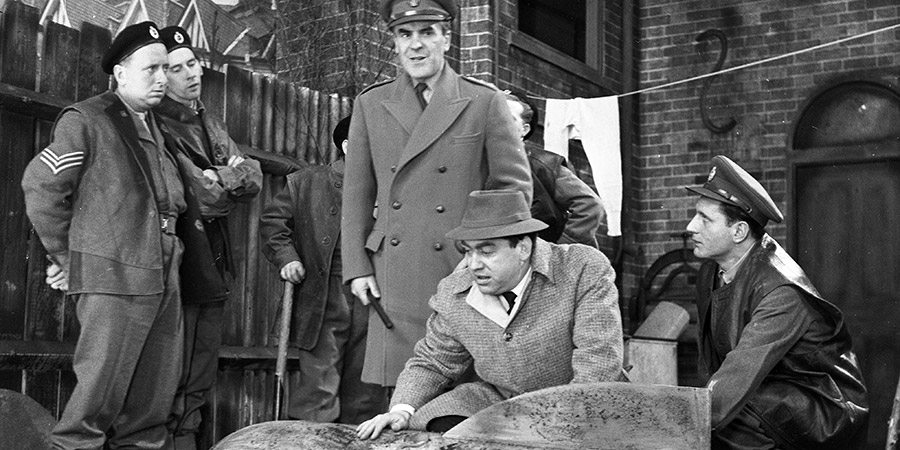
He also took the trouble to cast the occasional players just as carefully as he did the regular characters. Appreciating that even sitcoms featuring top class stars can fall short of their full potential due to the shortcomings of poorly-picked guest performers, Wood established the practice (which would later be copied and continued by such protégés as David Croft) of assembling an unofficial repertory company of competent, clever and often very crafty comedy character actors (which included Hugh Lloyd, Alec Bregonzi, Totti Truman Taylor, John Vere, Peggy Ann Clifford, Robert Dorning, Johnny Vyvyan and Joanna Douglas) whom he knew he could trust to boost the believability.
Then came the cameras and the editing. This, especially, was where Wood went far beyond his contemporaries, including the similarly brilliant but far more impetuous Main Wilson, because of the way that, step by step, he shaped and set out the syntax of sitcom shooting.
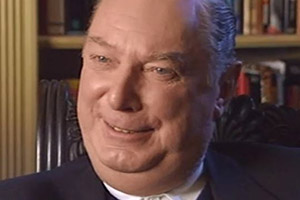
The three-camera studio set-up was already in use when he started, but he brought much more thought as to how he managed this basic arrangement. Although, for example, he immediately started making full use of his range of shots, and switched between them more swiftly than then was the norm, he did not cut from one camera to another simply because he could - the average number of cuts in the first couple of minutes of the establishing scene in an episode from 1956 (twelve) would remain about the same for an episode in 1960 - but he did connect the cuts remarkably shrewdly and smoothly to suit the rhythms of each script and the interactions of his actors.
The move actually began, he would later say, partly because, in most episodes, Galton and Simpson had a tendency to be somewhat dilatory at the start, dwelling on the show's basic relationship before allowing the action to unfold - and, while Wood always admired that willingness to extend and enrich the characterfulness of the comedy rather than subordinate everything to a storyline, he realised that it sometimes posed a problem for the pacing and the picture:
If you took the thirty-minute time span, they always used to write what I would call a nine-minute 'prologue' which had nothing to do with the plot. The plot started in about the tenth minute. And so you were left quite often at the beginning with just Sid and Tony talking at a table. Now, you can move artists around unnecessarily and get some movement in that way, but the other way you can move it is by camera work and cutting. And so I think it stemmed from the fact that you had to move the preliminary scene along a bit. Otherwise it looked a bit static. So we stepped up the cutting rate of the cameras.
Wood would then keep changing the rate, modulating it with masterful subtlety as the plot proceeded to take shape, so that, while the viewers simply felt as though they were following all of the sights and scenes gliding through with a swan-like serenity, the technical dynamics beneath the surface were quite exceptional: 'At the end,' he would say of the series, 'the average situation-comedy was working on something like a hundred-and-twenty to a hundred-and-thirty camera shots. And we were working on over two-hundred'.
Duncan Wood, however, was by no means only concerned with using the potential of cutting for the purposes of pacing. He was also particularly quick to appreciate that the cameras needed to help do for Hancock on TV what the microphone had done on its own on the radio, moving in or out to catch all the intricacies that the wireless had conveyed only in sound. The close-up, especially, was something that Wood worked hard with the whole ensemble of actors to employ in all of its comic significance, seeking out every moment, and every way, to guide the viewers' eyes to where each and every laugh was lurking.
He also recognised that, whereas sound alone had limited the sitcom actor to the utterance of a line, vision now liberated them so as to encompass their inaudible impact, and so he mastered the art of choreographing, and capturing, reaction shots to maximise the comic effect. 'Any fool,' he said, 'given certain technical qualifications, can shoot dialogue; it takes far more to shoot reactions to dialogue. So you get a man who says a funny line and you stay on him for part of the laugh and then switch to the man at the receiving end of the line and accept the rest of the laugh while showing his reaction. Then you go back. It makes it look as if neither of them has stopped. It makes it flow.'
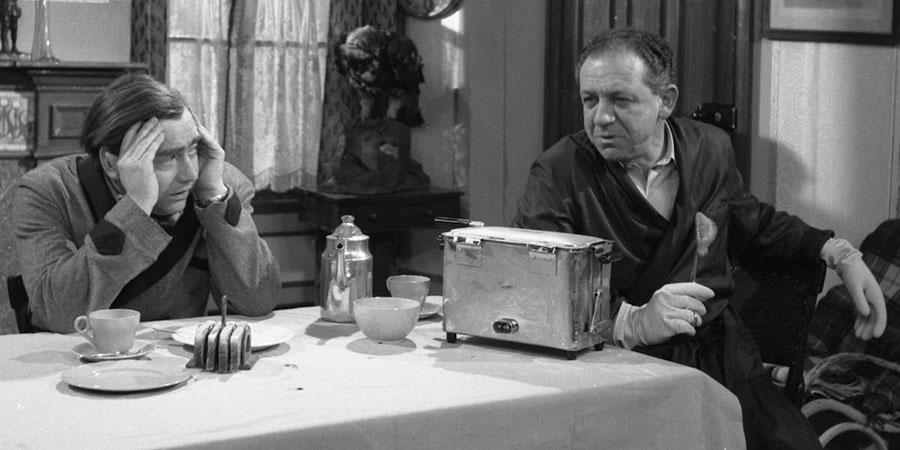
This strategy did not merely exploit the already fine ability of Tony Hancock (along with the other performers) to get laughs from looks as well as lines; it also progressively improved that gift, as the actor now knew that no nuance, even when he was mute, was ever likely to be missed.
The recording process was further refined in 1958, following the third TV series, when Wood finally succeeded in persuading his bosses to let him make two key changes. Typical of the way that he tended to pursue his artistic ambitions within what was then the cautious and conservative climate of the BBC, he seized on existing practical problems to push through his long-desired innovations.
In this case the catalyst concerned Tony Hancock's ongoing susceptibility to spoonerisms and malapropisms ('Who's been messing about with me concrete toadstools?' for example, would come out as: 'Who's been messing about with me cardboard nutmegs?') and more general struggles memorising his scripts (the convenience of being able to read from a page while on the radio had merely hidden, and indeed encouraged, a basic lack of discipline when it came to learning lines), along with his increasingly frequent bouts of ill-health (aside from drink-related issues, he had also recently missed a recording due to an attack of Asian flu). Wood used these frequent threats to the show's steady output to win the right to alter the shooting schedule, recording four episodes in advance of the televising of the series (and the usual tight alternation between filming and transmission that accompanied it), allowing him to slot each one into the thirteen-week run at monthly intervals and still have a stand-by edition ready for any emergency.
More importantly, in terms of its influence on future sitcom-making in general, Wood also managed, not much later, to get his sceptical superiors to rubber-stamp his request (initially as 'an experiment') to move from primitive tele-recording to the much-higher quality video recording via the BBC's newly-installed Ampex machine. This not only greatly reduced the strain on Tony Hancock, who was now freed from the pressure of trying to survive single big blocks of 'as live' filming sessions, but also enabled Wood to break up the recording of every episode into segments of five to eight minutes each.
This created regular intervals in which the lighting could be adjusted, scenery altered, cameras re-positioned, costumes changed and dialogue checked. It also made it comparatively simple and far more practicable for re-takes to be arranged and made.
Thanks to this and all of his other revisions and revolutions, Duncan Wood gradually pieced together the pattern for sitcom production that, though enhanced every now and then by various further technological advancements, remained in place all the way through to today. His innovations, combined with the clarity and coherence whereby each one was assimilated into the overall process, makes his significance in the history of the British sitcom unquestionably immense.
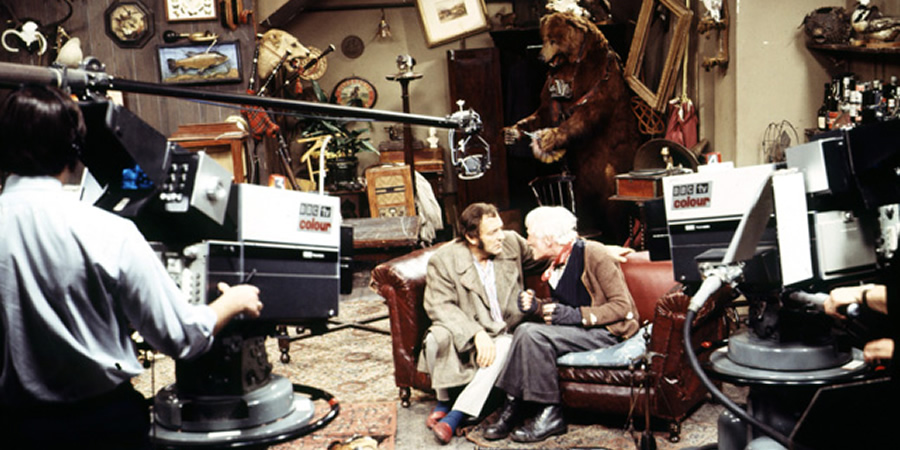
Rewarded in 1960 by being elevated to the role of Chief Assistant Head of Programmes in the BBC's Light Entertainment Department, Wood would go on, after his long and hugely successful association with Hancock, to further refine the system, and make it shine even brighter, via a string of other stellar sitcoms. It was this relentless pursuit of perfection that saw him start this next stage in his career with Steptoe And Son (1962-70).
With Steptoe And Son, Wood won the genre even greater prominence and respect, thanks in part to his recruitment of two 'straight' actors, Wilfrid Brambell and Harry H. Corbett, rather than the then-conventional choice of popular comedians, as his stars. Although this was a move that is often now regarded as revolutionary in and of itself, it was, actually, in his eyes, part of a revolutionary process that he had started during the Hancock shows:
With Hancock, we gradually went away from using supporting people like Kenneth Williams to having 'ordinary' actors, because it just added to the realism of the scenes. You know, if there was a knock at the door and you opened it and there was a copper there, and he was played by Kenneth Williams - 'Good evenin'!' - okay, you've got a good laugh, but your reality is totally suspended. So in the last few series I used actors who could seem like, say, a real policeman, who you could believe in. So the idea of working with actors started in Hancock's Half Hour. The big change with Steptoe, of course, was to have actors in the lead roles as well. That was the next step forward.
He also encouraged his writers - who were again Galton and Simpson - to go with their instincts and start bringing a darkness to their comic art, exploring the tense and often torturous but enduringly tough familial bond at the show's heart with, for a sitcom, an unprecedented degree of honesty, compassion and insight. This aim, Wood later acknowledged, was aided by the other, less-appreciated, impact made by the two main actors:
It is a far greater challenge to work with comedy actors than it is to write for a comedian. I mean, your whole access when working with a comedian is to put your money where the light is - you're propagating a personality. Whereas working with actors, you're writing a scene. And that's a different proposition, and a more challenging one. So that made Alan and Ray better writers, I think. That made them stretch themselves.
Steptoe And Son did not just underline the powerful appeal of the well-made sitcom; it also highlighted its potential as art. Some compared it to Beckett, and others to Pinter. The Russian comedian Arkady Raikin, who saw an episode during a brief visit to England, was so moved that he exclaimed, 'This is not comedy - it's Gogol!'
This rare and special achievement was, of course, mainly down to the writers and the actors. Both of those parties, nonetheless, were quick to acknowledge how much of it had been made possible by Duncan Wood.
His other successes during this extraordinarily productive period would include Citizen James (1960-62), Hugh And I (1964-7), The Bed-Sit Girl (1965-6), The Further Adventures Of Lucky Jim (1967), Harry Worth (1967-8), Oh Brother! (1968-70), Now, Take My Wife (1971) and numerous editions of Comedy Playhouse (1961-71), as well as the movie The Bargee (1964) and one of the country's first comedy series to be broadcast in colour, The World Of Beachcomber (1968). Indeed, if one accepts the idea that this era was truly a 'golden age' for BBC comedy in general and especially for sitcoms, then one also needs to appreciate that Duncan Wood, more so than any other programme-maker, made it glitter and glow so brightly and enduringly.
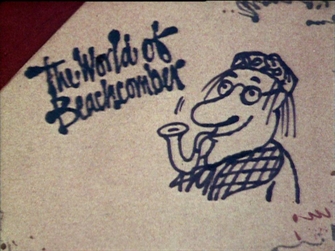
It was while working on The World Of Beachcomber, with Spike Milligan as his star, that he provided yet another telling demonstration of his consummate command of the skills of a producer/director. Milligan's edgily erratic manner as a performer, as well as his frequently alarming volatility as a colleague, had driven quite a few programme-makers over the years screaming from the scene, but the always-calm and cool-headed Wood coped with him as well as anyone ever did.
The issue here was that, while the two men had always enjoyed each other's company ('You and I are going to get on very well,' the comedian said after their very first meeting a few years earlier, 'because you're the only BBC producer I know who plays the piano and the trumpet!'), and Wood was happy to have Milligan be his usual anarchic self when he was writing his own material, this particular series was meant to be an homage to the style of humour of another author (namely, J.B. Morton), and so required Milligan to exercise some self-restraint. Wood therefore devised some special measures to maintain the desired focus:
Spike was always ad-libbing and wandering off the script. And some of it was very good and some of it wasn't. So I decided that I wouldn't let him learn one word. We'd rehearse for five days and consign the whole lot to a teleprompter so he had to read it. And it was very successful. Spike was in a sort of straitjacket, but he was very funny with it. And, yes, I guess I was a bit tough with him. But at the end of the series, a little package arrived on my desk at the BBC, from Spike. It was a little box tied up with ribbon. And I undid it, and inside was one of those little clockwork tanks that you wind up and then it goes across the desk on treads firing sparks out of a gun. And also inside was a message from Spike, saying: 'You should never have been a television director. You should have been a Sergeant-Major in the Tank Corps!' I think that just about sums up our relationship on that series. But he was lovely.
The series did not just attract a great deal of critical admiration (along with what would be, shamefully, Wood's solitary BAFTA nomination). It also won Milligan some of the best notices he had received in years. It took a master to help a master.
Wood was promoted in 1971 to the position of Head of Comedy, from where he not only acted as an invaluable mentor to a whole new generation of writers, performers and technicians, but also helped nurture a whole new set of shows that included The Two Ronnies, Last Of The Summer Wine, Some Mothers Do 'Ave 'Em, My Wife Next Door, Are You Being Served?, Porridge, Open All Hours, Sykes, Dave Allen At Large and Whatever Happened To The Likely Lads?.

Wood left the BBC in October 1973 when an old colleague, Paul Fox (a former Controller of BBC One), persuaded him to join Yorkshire Television (where Fox was now Director of Programmes) as its first Head of Light Entertainment. Fox celebrated this coup by pointing out to the press that Wood 'has been responsible for more successful comedy programmes in British television than anyone else', and then, very wisely, he left his friend alone to do more or less whatever he wanted to improve both the quantity and quality of the company's variety and comedy output.
Wood succeeded once again. During his tenure there, aside from commissioning various game, panel and music shows, he brought to network TV such popular comedies as Rising Damp, Dawsons Weekly, Oh No It's Selwyn Froggitt, Only When I Laugh, You're Only Young Twice, My Old Man, Francis Howerd In Concert, In Loving Memory, The Bounder, That's My Boy, The Gaffer, Hello Cheeky, The Galton & Simpson Playhouse and Duty Free.
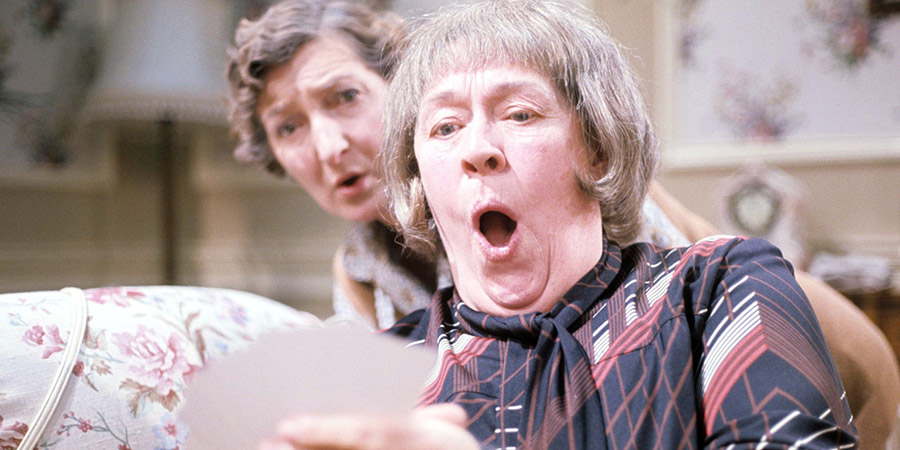
It was a remarkable - if somewhat under-publicised - achievement as an executive. Wood, more than anyone else, turned Yorkshire TV into a significant force in British television entertainment in general and comedy in particular, earning a reputation for it that was admired by all of his rivals (and envied by more than a few).
He retired at the end of 1984, but continued to serve as a consultant, first formally and then informally, for several more years. As a man who had always known how to make his crew better, his cast better and the overall viewing experience of his audience better, there was no more suitable, nor more generous, authority for any young programme-maker to listen to and learn from.
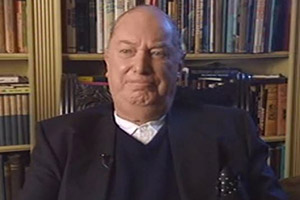
Our heroes of comedy are not limited to the side of the screen that we see. This man, behind the scenes, was a hero indeed.
Duncan Wood died, at the age of seventy-one, on 11th January 1997, nine days before the death of his old friend and fellow pioneer, Dennis Main Wilson. What a loss the two of those legends were, but what a legacy they left behind.
Help British comedy by becoming a BCG Supporter. Donate and join us in preserving, amplifying and investing in comedy of all forms, from the grass roots up. Advertising doesn't cover our costs, so every single donation matters and is put to good use. Thank you.
Love comedy? Find out more
